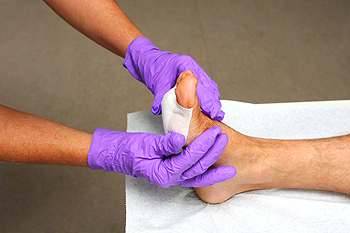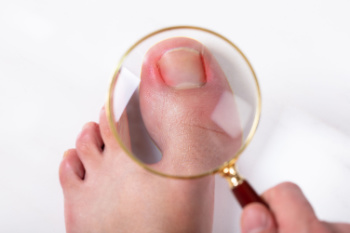
A foot ulcer is an open sore that usually forms on the bottom of the foot, often caused by pressure, friction, or injury. This condition is particularly common in people with diabetes or poor circulation, as high blood sugar and reduced blood flow can slow down the healing process. Foot ulcers can be painful, and if left untreated, they can become infected or worsen over time. Managing a foot ulcer requires careful wound care, including regular cleaning, applying the right dressings, and protecting the area from further injury. It is also important to manage underlying conditions like diabetes by keeping blood sugar levels under control. A podiatrist can help by providing antibiotics if an infection is present, recommending proper footwear, and advising on techniques to offload pressure from the affected area. These steps are key in promoting healing and preventing recurrence. If you have developed a foot ulcer, it is suggested that you make an appointment with a podiatrist for proper care and treatment.
Wound care is an important part in dealing with diabetes. If you have diabetes and a foot wound or would like more information about wound care for diabetics, consult with one of our podiatrists from PA Foot & Ankle Associates. Our doctors will assess your condition and provide you with quality foot and ankle treatment.
What Is Wound Care?
Wound care is the practice of taking proper care of a wound. This can range from the smallest to the largest of wounds. While everyone can benefit from proper wound care, it is much more important for diabetics. Diabetics often suffer from poor blood circulation which causes wounds to heal much slower than they would in a non-diabetic.
What Is the Importance of Wound Care?
While it may not seem apparent with small ulcers on the foot, for diabetics, any size ulcer can become infected. Diabetics often also suffer from neuropathy, or nerve loss. This means they might not even feel when they have an ulcer on their foot. If the wound becomes severely infected, amputation may be necessary. Therefore, it is of the upmost importance to properly care for any and all foot wounds.
How to Care for Wounds
The best way to care for foot wounds is to prevent them. For diabetics, this means daily inspections of the feet for any signs of abnormalities or ulcers. It is also recommended to see a podiatrist several times a year for a foot inspection. If you do have an ulcer, run the wound under water to clear dirt from the wound; then apply antibiotic ointment to the wound and cover with a bandage. Bandages should be changed daily and keeping pressure off the wound is smart. It is advised to see a podiatrist, who can keep an eye on it.
If you have any questions, please feel free to contact one of our offices located in Allentown, Easton, Northampton, and Chew Street in Allentown, PA . We offer the newest diagnostic and treatment technologies for all your foot care needs.

Pinky toe pain while walking can result from several underlying causes, each affecting comfort and mobility. Common reasons include wearing ill-fitting shoes that place pressure on the outer edge of the foot, leading to irritation or inflammation. Fractures, sprains, or dislocations from minor trauma may also cause sharp or persistent pain in the pinky toe. Other potential causes include bunions, corns, or nerve compression such as a pinched nerve. Symptoms often include tenderness, swelling, redness, or difficulty bearing weight on the affected foot. Some individuals may experience a throbbing or burning sensation, especially after extended periods of walking or standing. Having pinky toe pain may cause difficulty in completing daily activities. If this applies to you, it is suggested that you consult a podiatrist who can determine what the cause is, and offer appropriate treatment solutions.
Toe pain can disrupt your daily activities. If you have any concerns, contact one of our podiatrists of PA Foot & Ankle Associates. Our doctors can provide the care you need to keep you pain-free and on your feet.
What Causes Toe Pain?
Most severe toe pain is caused due to a sports injury, trauma from dropping something heavy on the toe, or bumping into something rigid. Other problems can develop over time for various reasons.
Toe pain can be caused by one or more ailments. The most common include:
- Trauma
- Sports injury
- Wearing shoes that are too tight
- Arthritis
- Gout
- Corns and calluses
- Hammertoe
- Bunions
- Blisters
- Ingrown toenails
- Sprains
- Fractures (broken bones)
- Dislocations
When to See a Podiatrist
- Severe pain
- Persistent pain that lasts more than a week
- Signs of infection
- Continued swelling
- Pain that prevents walking
Diagnosis
In many cases the cause of toe pain is obvious, but in others, a podiatrist may want to use more advanced methods to determine the problem. These can range from simple visual inspections and sensation tests to X-rays and MRI scans. Prior medical history, family medical history, and any recent physical traumatic events will all be taken into consideration for a proper diagnosis.
Treatment
Treatments for toe pain and injuries vary and may include shoe inserts, padding, taping, medicines, injections, and in some cases, surgery. If you believe that you have broken a toe, please see a podiatrist as soon as possible.
If you have any questions please feel free to contact one of our offices located in Allentown, Easton, Northampton, and Chew Street in Allentown, PA . We offer the newest diagnostic tools and technology to treat your foot and ankle needs.

An ingrown toenail is more than a nuisance. It can quickly become a painful and persistent problem. When the nail’s edge presses into the skin, irritation follows. If ignored, this small issue can develop into an infection that impacts your ability to walk comfortably. Many factors contribute to ingrown toenails, including trimming nails too short, wearing shoes that squeeze the toes, and sustaining toe injuries. Some individuals are simply more prone to this condition due to the natural shape of their nails. Prevention often begins with simple habits, such as cutting toenails straight across and avoiding overly tight footwear. However, once an ingrown nail becomes inflamed or infected, professional care is the best option. If you are experiencing persistent toe pain or signs of infection, it is recommended that you see a podiatrist for a thorough evaluation and appropriate treatment.
Ingrown toenails can become painful if they are not treated properly. For more information about ingrown toenails, contact one of our podiatrists of PA Foot & Ankle Associates. Our doctors can provide the care you need to keep you pain-free and on your feet.
Ingrown Toenails
Ingrown toenails occur when a toenail grows sideways into the bed of the nail, causing pain, swelling, and possibly infection.
Causes
- Bacterial infections
- Improper nail cutting such as cutting it too short or not straight across
- Trauma to the toe, such as stubbing, which causes the nail to grow back irregularly
- Ill-fitting shoes that bunch the toes too close together
- Genetic predisposition
Prevention
Because ingrown toenails are not something found outside of shoe-wearing cultures, going barefoot as often as possible will decrease the likeliness of developing ingrown toenails. Wearing proper fitting shoes and using proper cutting techniques will also help decrease your risk of developing ingrown toenails.
Treatment
Ingrown toenails are a very treatable foot condition. In minor cases, soaking the affected area in salt or antibacterial soaps will not only help with the ingrown nail itself, but also help prevent any infections from occurring. In more severe cases, surgery is an option. In either case, speaking to your podiatrist about this condition will help you get a better understanding of specific treatment options that are right for you.
If you have any questions please feel free to contact one of our offices located in Allentown, Easton, Northampton, and Chew Street in Allentown, PA . We offer the newest diagnostic and treatment technologies for all your foot and ankle needs.

